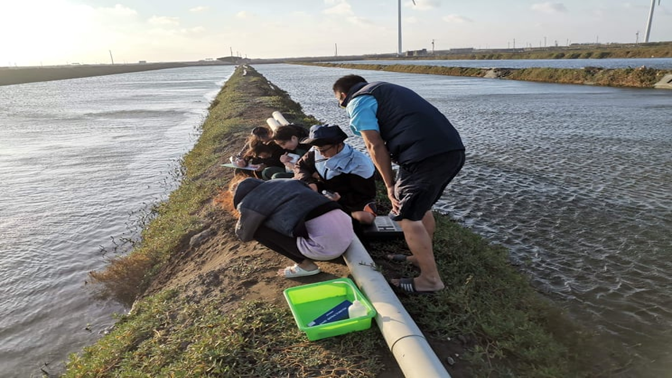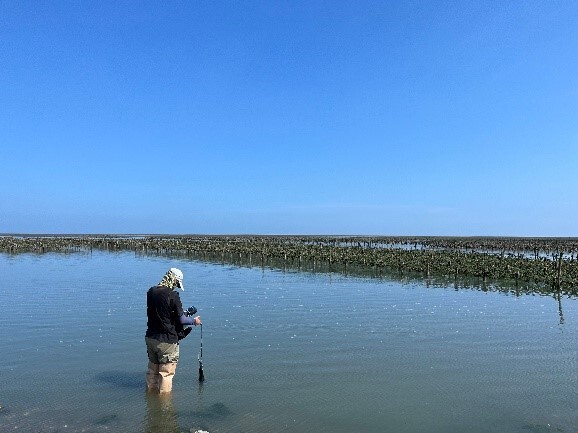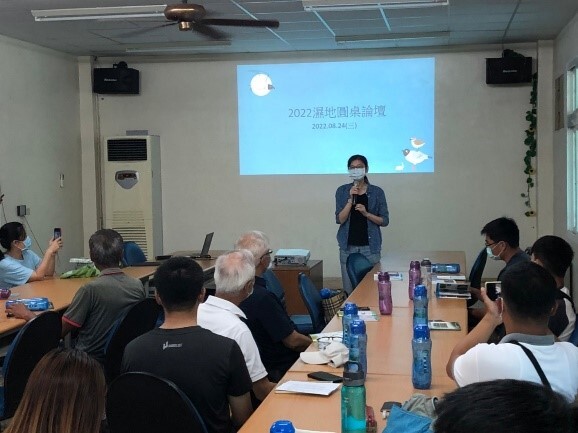SDG 14.5.2 Monitoring the health of aquatic ecosystems
NCUE has ongoing projects and activities, including the Environmental Education Center’s “2020-2022 In-Depth Cultivation of Fangyuan, Working Hand in Hand with Dacheng: Industrial and Environmental Sustainability Plan of the Two Townships of Changhua County Project”. The Department of Geography’s “Monitoring of Agriculture’s and Fishery’s Social and Ecological Systems in the Coastal Wetlands of Western Taiwan” What follows is a brief description of the projects.
1. “Fangyuan Reconstruction USR Seed Type Project” and “2020-2022 Sprouting programme for In-Depth Cultivation of Fangyuan, Working Hand in Hand with Dacheng: Industrial and Environmental Sustainability Plan of the Two Townships of Changhua County Project”:
Included service plan: Monitoring is conducted twice a month on a regular basis. Members: 22 teachers and students at NCUE, with technical cooperation from the Fisheries Research Institute and Hungkuang University monitored and investigated 15 fish farms, four coastal water inlet channels, and groundwater wells of the Changhua County Aquaculture and Fisheries Development Association, providing real-time water quality and bacteria detection, and also monitoring and analyzing the health of the coastal aquatic ecosystems, related event photos as shown in Figure 1.
|
|
|
Figure 1. A water quality inspection and monitoring service team consists of teachers and students in NCUE. They conduct water quality and bacteria inspection and monitor coastal aquatic ecosystem at coastal water inlets and fish farms in Changhua every 2 weeks |
Link to the FB page of the projects: https://www.facebook.com/NCUEUSR/photos/?tab=album&ref=page_internal.
2. Monitoring of Agriculture’s and Fishery’s Social and Ecological Systems in the Coastal Wetlands of Western Taiwan:
The Department of Geography of NCUE undertook the National Science and Technology Council’s “Monitoring of Agriculture’s and Fishery’s Social and Ecological Systems in the Coastal Wetlands of Western Taiwan (2/3)” project. The project is centered around Fangyuan and focuses on establishing a local research demonstration initiative for long-term, fundamental, and critical observations of core aspects of the socio-ecological system. As part of the long-term socio-ecological core observation, NCUE has set up the Changhua Station for observation. The environmental and ecological surveys at the Yongxing Wanggong Aquaculture Area’s canals involve monthly water quality monitoring. These surveys were conducted from February 2022 to July 2023, and we plan to continue these monitoring activities in the future. In-depth interviews with key local stakeholders are a vital component of the social research conducted at our observation station. These interviews help expand the platform’s local social network and involve representatives from various local stakeholders, including governing bodies, cultural organizations, industry groups, developers, producers, and others. Through these interviews, the project team collects systematic information about different roles, functions, and relationships of these stakeholders and their experiences and observations regarding the complex changes in the local society and ecology. This information forms the essential foundation of social-ecological data for the LTSER platform. Staff from the station actively participate in local events to discover relevant issues and collaborate with local communities. We aim to ensure that our long-term observational data can simultaneously address local needs, related event photos as shown in Figures 2-3.
|
|
|
|
Figure 2. Water quality observation at the observation station along the coast of Fangyuan after the algal bloom incident |
Figure 3. Attending the Wetland Roundtable organized by Changhua Bird Watcher’s Association in Fangyuan |
Link for reference information:
https://www.facebook.com/LTSER_Changhua-107002388661252/.



